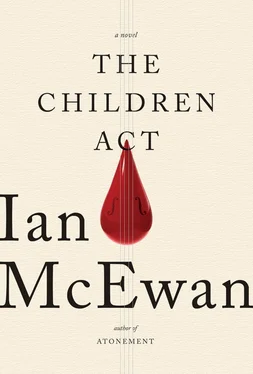She said gently, “You know that isn’t possible.”
“I wouldn’t get in the way, I mean, with you and your husband.” Finally, he removed his hands and looked at her. “You know, like a sort of lodger. When I’ve finished my exams I could get a job and pay you some rent.”
She saw the spare room and its twin single beds, the teddies and other animals in the wicker basket, the toy cupboard so crammed that one door would not close. She coughed abruptly and stood, and went the length of the room to the window and made a show of looking out into the dark. At last, without turning, she said, “We only have one spare room and a lot of nephews and nieces.”
“You mean that’s your only objection?”
There was a tap on the door and Pauling came in. “Here in two minutes, My Lady,” he said, and left.
She came away from the window and went back toward Adam and stooped to pick up his backpack from the floor.
“My clerk will go with you in a taxi, first to the station to buy you a ticket to Birmingham tomorrow morning and then to a hotel close by.”
After a pause he got slowly to his feet and took the bag from her. Despite his height, he looked like a small child in shock.
“Is that it, then?”
“I’d like you to promise me you’ll contact your mother again before you get on the train. Tell her where you’ll be.”
He didn’t reply. She handed him toward the door and they went out into the hall. No one in sight. Caradoc Ball and his guests were settled in the drawing room behind closed doors. She left Adam waiting by the library while she went to her room to get money from her handbag. On her way back, she saw the whole scene from her elevated position at the top of the grand staircase. The front door was open and the butler was talking to the driver. Behind him, below the portico steps, was the taxi, door open to release the cheery swooping sounds of Arabic orchestral music. Her clerk was crossing the hall at a pace, presumably to prevent the butler from creating a problem. As for Adam Henry, he was still by the library entrance, pressing the bag in his arms against his chest. By the time she reached him, the butler, the driver and the clerk were outside on the gravel by the car discussing, she hoped, a suitable hotel.
The boy started to say, “But we haven’t even—” and she raised a hand to shush him.
“You must go.”
Lightly, she took the lapel of his thin jacket between her fingers and drew him toward her. Her intention was to kiss him on the cheek, but as she reached up and he stooped a little and their faces came close, he turned his head and their lips met. She could have drawn back, she could have stepped right away from him. Instead, she lingered, defenseless before the moment. The sensation of skin on skin obliterated any possibility of choice. If it was possible to kiss chastely full on the lips, this was what she did. A fleeting contact, but more than the idea of a kiss, more than a mother might give her grown-up son. Over in two seconds, perhaps three. Time enough to feel in the softness of his lips that overlay their suppleness all the years, all the life, that separated her from him. As they withdrew, a slight adhesion of skin might have drawn them back together. But there were approaching footsteps on the gravel and on the stone steps outside. She let go of his lapel and said again, “You must go.”
He picked up his backpack, which he had dropped to the floor, and followed her across the hall and out into the fresh night air. At the foot of the steps the driver gave a friendly salute and opened the taxi’s rear door. The music had been turned off. She had intended to give the cash to Adam, but in a sudden pointless change of mind, she handed it to Pauling instead. He nodded and grimaced as he took the thin roll of notes. With a brusque movement of his shoulders, Adam seemed to shake himself free of all of them and ducked into the backseat and sat with the bag on his lap, staring straight ahead. Already beginning to regret what she had set in train, she moved around the car in order to exchange a last look with him. He was surely aware of her, but he turned his head away. Pauling got in the front beside the driver. The butler closed Adam’s door with a dismissive backhand flourish. Shoulders hunched, Fiona hurried up the cracked stone steps as the taxi drew away.
Five

SHE MOVED ON from Newcastle after a week, judgments handed down or delayed pending reports, leaving contented or embittered parties, some of whom had the meager comfort of leave to appeal. In the case she had described to Charlie at dinner, she granted residence to the grandparents, and allowed supervised weekly contact to the mother and father separately, with a return date set for six months. By then, whoever sat in her place would have the benefit of a progress report on the children’s welfare, the parents’ promises to attend an addiction program, and the mother’s mental state. The little girl would stay at her school, a Church of England primary, where she was well known. Fiona found the conduct of the local authority’s children department in this case to be exemplary.
In the late afternoon of Friday she said her farewells to the court officials. On Saturday morning at Leadman Hall, Pauling loaded the boot of the car with documents in boxes and her robes on hangers. With their personal luggage piled on the backseat and the judge installed in front, they headed west for Carlisle by way of the Tyne Gap, across the whole width of England, Cheviots to the right, Pennines to the left. But the drama of geology and history was dulled by traffic, its volume, its routines and the road furniture that uniformly defined the British Isles.
They were slowing to walking pace through Hexham, her phone lay idle in her hand and she was thinking, as she had during various interludes all week, of the kiss. What impulsive folly, not to have pulled away. Professional and social madness. In memory, the actual contact, flesh on flesh, tended to extend in time. Then she would try to cut the moment back to a blameless peck on the lips. But that peck soon swelled again, until she no longer knew what it was or what had happened or for how long she had risked disgrace. Caradoc Ball could have stepped out into the hall at any point. Worse, one of his guests, unconstrained by tribal loyalty, might have seen her and told the world. Pauling could have turned back indoors from his conversation with the taxi driver and surprised her. Then the sensitively constructed distance between them that made her work possible would have been destroyed.
She was not prone to wild impulses and she didn’t understand her own behavior. She realized there was much more to confront in her confused mix of feelings, but for now it was the horror of what might have come about, the ludicrous and shameful transgression of professional ethics, that occupied her. The ignominy that could have been all hers. Hard to believe that no one had seen her, that she was leaving the scene of the crime unscathed. Easier to believe that the truth, hard and dark as a bitter seed, was about to reveal itself: that she had been observed and hadn’t noticed. That even now, miles behind her in London, the case was being discussed. That one day soon she’d hear on her phone the hesitant embarrassed voice of a senior colleague. Ah, Fiona, look, awfully sorry but I’m afraid I should warn you, uh, something’s come up . Then, waiting for her back at Gray’s Inn, a formal letter from the Judicial Complaints investigation officer.
She tapped two keys to summon her husband on the phone. In flight from a kiss, running scared for the cover of a married woman of some repute, some solidity. She made the call without thinking, out of habit, barely aware of the state of play between her and Jack. When she heard his tentative hello, the acoustic told her that he was in the kitchen. The radio was playing, Poulenc perhaps. On Saturday mornings they always had, always used to have, a lazy but early breakfast, a spread of papers, muted Radio Three, coffee, warmed pain aux raisins from Lamb’s Conduit Street. He would be in his paisley silk dressing gown. Unshaven, hair uncombed.
Читать дальше













